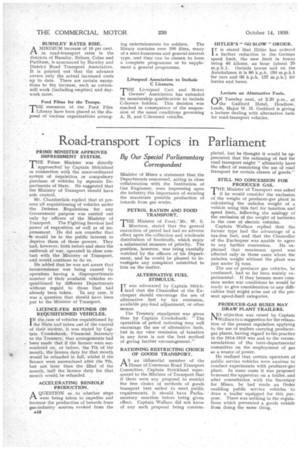Road-transport Topics in Parliament
Page 20

If you've noticed an error in this article please click here to report it so we can fix it.
By Our Special Parliamentary Correspondent
PRIME MINISTER APPROVES IMPRESSMENT SYSTEM.
THE Prime Minister was directly approached by Captain Strickland in connection with the unco-ordinated system of requisition or compulsory purchase of vehicles by separate Departments of State. He suggested that the Ministry of Transport should have sole control.
Mr. Chamberlain replied that at present all requisitioning of vehicles under the Defence Regulations for any Government purpose was carried out only by officers of the Ministry of Transport. The Fighting Services had power of reqmsition al well as of impressment. He did not consider that It • would be in the public interest to deprive them of those powers. They had, however, both before and since the outbreak of war, operated in close contact with the Ministry of Transport, and would continue to do so.
He added that he was not aware that inconvenience was being caused by operators having a disproportionate number of their available vehicles requisitioned by different Departments without regard to those that had already been taken. In any case, it was a question that should have been put to the Minister of Transport_ LICENCE-FEE REFUNDS ON REQUISITIONED VEHICLES.
I N the case of vehicles requisitioned by
the State and taken out of the control of their owners, it was stated by Captain Crookshank, Financial Secretary to the Treasury, that arrangements had . been made that if the licence were surrendered on, or before, the 7th of the month, the licence duty for that month would be refunded in full,' whilst if the licence were surrendered after the 7th, but not later than the 22nd of the month, half the licence duty for that month would be refunded.
ACCELERATING BENZOLE PRODUCTION.
A QUESTION as to whether steps were being taken -to expedite and increase the production of benzole from gas-industry sources evoked Loin the *18
Minister of Mines a statement that the Departments concerned, acting in close collaboration with the Institution of Gas Engineers, were impressing upon the industry the importance of securing the maximum possible production of henzole from gas works.
PETROL RATION AND FOOD TRANSPORT.
THE Minister of Food,' Mr. W. S. Morrison, stated that the general restriction of petrol had had no adverse effect upon the collection and wholesale distribution of foodstuffs, which enjoy a substantial measure of priority. The position, however, was being carefully watched by the officers of his Department, and he would be pleased to investigate any complaint submitted to him on the matter.
ALTERNATIVE FUEL STIMULUS.
I T was advocated by Captain Strick land that the Chancellor of the Exchequer should encourage the use of alternative fuel by tax remission, available pay-load adjustment, or other means.
The Treasury standpoint was given thus by Captain Crookshank: " The operation of petrol rationing may well encourage the use of alternative fuels,• but in my -view remission of taxation in any form is not the best method of giving further encouragement."
RATIONING RESTRICTING CHOICE OF GOODS TRANSPORT.
AS an influential member of the CI. House of Commons Road Transport Committee, Captain Strickland represented to the Minister of Transport that if there were any proposal to restrict the free choice of methods of goods transport best suited to meet public requirements, it should have Parliamentary sanction before being given effect. Captain Wallace did not know of any such proposal being contem
plated, but he thought it would be appreciated that the rationing of fuel for road transport might "ultimately have the effect of restricting the use of road transport for certain classes of goods."
STILL NO CONCESSION FOR PRODUCER GAS.
THE Minister of Transport was asked if he would consider the exclusion of the weight of producer-gas plant in calculating the unladen weight of a vehicle using this fuel for taxation and speed limit, following the analogy of the exclusion of the weight of batteries in the case of electric vehicles.
Captain Wallace replied that the former type had the advantage of a tax-free fuel, and that the Chancellor of the Exchequer was unable to agree to any further concession. He explained that maximum speed was affected only in those cases where the unladen weight without the plant was just under 21 tons.
The use of producer gas vehicles, he continued, had so far been mainly experimental. If they became more common under war conditions he would be ready to give consideration to any difficulties that might arise out of the present speed-limit categories.
PRODUCER-GAS BUSES MAY DRAW PLANT TRAILERS.
MO objection was raised by Captain Wallace to a suggestion for the relaxation of the present regulation applying to the use of trailers carrying producergas plants, having regard to the practice in the 1914-1918 war and to the recommendations of the inter-departmental committee on the employment of gas as a source of power.
He realized that certain operators of public service vehicles were anxious to conduct experiments with producer-gas plant. In some cases it was proposed to mount the apparatus on a trailer, and after consultation with the Secretary for Mines, he had made an Order enabling public service vehicles to draw a trailer equipped for this purpose. There was nothing in the regulations which prevented a goods vehicle from doing the same thing.




















































